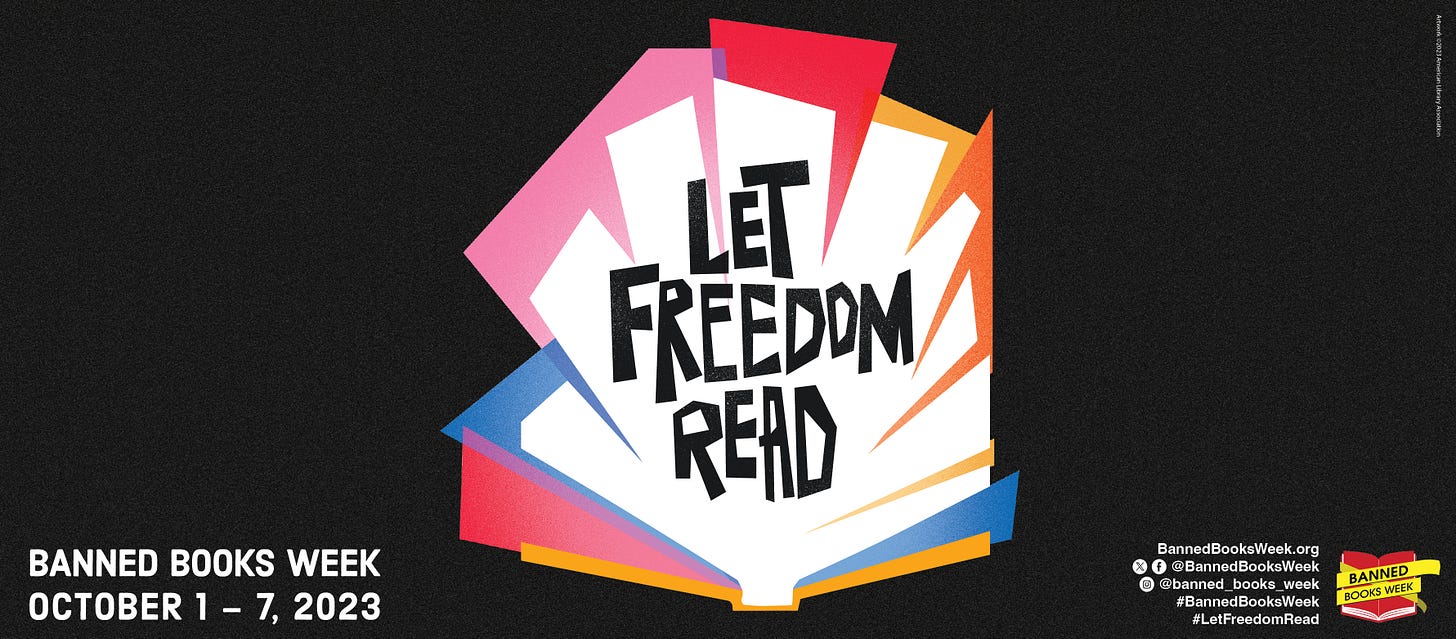Vaccines don't protect you; Why People Hate Your Freedom to Read; Back to Pern
My thoughts on reading, writing, art, and whatever else interests me.
No, I haven’t gone anti-vax on you. Get vaccinated. Wear a mask. Simple steps that are your best option to stay healthy.

My issue is how writers and experts write and talk about vaccines. We’ve seen it repeatedly during the (ongoing) COVID-19 pandemic. I saw it again today in an article published by AARP post about BA.2.86 “Pirola.”1 The article quotes Andy Pekosz.
“Vaccines oftentimes will continue to protect against severe disease, even if they lose the ability to protect against infection. We’re hoping that it can’t evade enough to really cause very severe disease at a high rate.”
Vaccines don’t directly protect against severe disease or infection. Vaccines are an instruction manual for our immune system. It’s meant to teach our cells how to create the antibodies that can bind to the virus and eliminate it from the body. The vaccine doesn’t hang out like biological sentries ready to pounce on the virus.
The CDC page Understanding How COVID-19 Vaccines Work does a mixed job of explaining the vaccines. The summary is good.
COVID-19 vaccines help our bodies develop immunity to the virus that causes COVID-19 without us having to get the illness.
That’s right. A vaccine helps us develop immunity (of some degree, depending on our individual immune system) without getting sick. That’s important. The disease can cause both short-term and long-term damage to our bodies—best to avoid that, if possible.
Then the CDC lapses into the same confused language when they talk about the details.
It typically takes a few weeks after vaccination for the body to produce T-lymphocytes and B-lymphocytes. Therefore, it is possible that a person could be infected with the virus that causes COVID-19 just before or just after vaccination and then get sick because the vaccine did not have enough time to provide protection. [bold added for emphasis]
It starts out good, explaining that it takes a few weeks for the body to produce the necessary lymphocytes. If someone gets sick, it isn’t because the vaccine didn’t have enough time—their body didn’t have enough time to produce the lymphocytes. Usually, though, the CDC page gets it right with clear language.
This immune response, which produces antibodies, is what helps protect us from getting sick from that germ in the future.
With mRNA vaccines, the vaccine breaks down within a few days and is eliminated. It isn’t hanging around providing protection. That’s the potential danger in writing or talking about vaccines as if the vaccine itself is providing protection from getting sick. People may feel they don’t need to take other precautions like wearing a mask because they think the vaccine is ‘protecting them’. A mask actually provides protection against getting sick (not just from COVID-19) by creating a barrier between you and sources of infection.
Maybe someday we’ll have nanotech or genetically-enhanced immune systems that provide active protection against illness. I’m sure nothing will go wrong with that idea2.
Banned Books Week, Oct. 1 - 7, 2023

I’ve spent over thirty years working in libraries and the attacks on libraries, our freedom to read, librarians, and writers has never been as bad as it is right now. It’s more than attacks on libraries—it is part of a concerted effort to restrict freedom, limit education, attack LGBTQ+ communities, and undermine the foundations of democracy.
My first library work experience was as a student worker in the school library, but we’d always gone to the library growing up. I worked as a library assistant in my college library. I left the library for a few years and returned to the same library to supervise students. After graduation, I accepted a job as a supervisor in the public library and have remained with the library since, earning two master’s degrees, managing a single library, overseeing a county of libraries, and eventually moving to the IT department as an administrator, data analyst, and ILS administrator. I’ve helped library patrons and staff, worked with library boards, and city councils. When I first started my public library career we didn’t have the internet, e-books, or broadband. We still stamped due dates on slips of paper in the items. I’ve overseen many of the technological changes over the past several decades. One thing hasn’t changed in all that time—you are free to read and access what you want. You don’t get to decide what other people read or access. It’s that simple. It’s at the heart of our democracy and free speech.
And that’s why some people hate your freedom. They want to control what you read, what you hear, watch, or access. If you’re free to access opposing viewpoints, you might think for yourself. You might be exposed to other ways of doing things. You might see the world through the experiences of other people. You might think more critically about what is happening in our country and world.
Librarians wrote the Freedom to Read Statement in 1953. They also wrote the Library Bill of Rights in 1939. I encourage everyone to read these two documents and other related documents. Today, though, I want to focus on the Library Bill of Rights.
You are free to read and access what you want. You don’t get to decide what other people read or access. It’s that simple. It’s at the heart of our democracy and free speech.
Library Bill of Rights
I. Books and other library resources should be provided for the interest, information, and enlightenment of all people of the community the library serves. Materials should not be excluded because of the origin, background, or views of those contributing to their creation.
II. Libraries should provide materials and information presenting all points of view on current and historical issues. Materials should not be proscribed or removed because of partisan or doctrinal disapproval.
III. Libraries should challenge censorship in the fulfillment of their responsibility to provide information and enlightenment.
IV. Libraries should cooperate with all persons and groups concerned with resisting abridgment of free expression and free access to ideas.
V. A person’s right to use a library should not be denied or abridged because of origin, age, background, or views.
VI. Libraries which make exhibit spaces and meeting rooms available to the public they serve should make such facilities available on an equitable basis, regardless of the beliefs or affiliations of individuals or groups requesting their use.
VII. All people, regardless of origin, age, background, or views, possess a right to privacy and confidentiality in their library use. Libraries should advocate for, educate about, and protect people’s privacy, safeguarding all library use data, including personally identifiable information.
Adopted June 19, 1939, by the ALA Council; amended October 14, 1944; June 18, 1948; February 2, 1961; June 27, 1967; January 23, 1980; January 29, 2019.
Inclusion of “age” reaffirmed January 23, 1996.
I look at the Library Bill of Rights and the Freedom to Read Statement and often find it difficult to understand why people would disagree with these documents. We can all find something in the library that offends us, that we disagree with, or simply don’t like. We can choose not to read those materials. I’m sure that those pushing to restrict freedoms wouldn’t be happy if there was an effort to ban materials they want. Libraries support freedom for everyone—clearly a dangerous attitude for those seeking to ban books and shut down libraries.
“No cookies! Just books.”
Back to Pern
Before humans walked on the Moon, before I was born, Anne McCaffrey wrote Dragonflight. It originally appeared in two parts in Analog. I can’t say when exactly I first discovered Pern, but it was probably around 1980ish. I read all of the books out at the time and more as they came out. Over the years I reread many of the books and collected them in a variety of formats. I also branched out to other books written by Anne McCaffrey, easily one of my favorite writers.
I realized that it has been a long time since I last re-read the Pern books. Remembering a book isn’t the same thing as experiencing it—and the details have faded in my memory until I’m left with bits and pieces. It has been a real pleasure to dive back into this series and fly with these dragons again. I loved every minute reading this book again and have gone on to the second, Dragonquest.
We’ve reached the end of this issue of READINARY. If you stuck with it this far—thank you! If you’re interested in showing more support for my work hop over to my shop and pick up copies of my books. If you use the links to pick up the books I share here, I also earn a small affiliate commission (for some of them) at no cost to you.
If you want. No problem if you don’t. I appreciate you reading this issue. I’ll likely be back in a couple weeks with another issue.
Best wishes, always—Ryan
Nania, Rachel. “Why a New COVID-19 Variant Has Scientists Worried.” AARP. August 29th, 2023.
Mason, John and Gray, Mike. “Unnatural Selection.” Star Trek: The Next Generation. https://www.wikiwand.com/en/Unnatural_Selection_(Star_Trek:_The_Next_Generation) (Accessed September 18, 2023).



